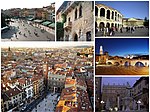Castelvecchio Bridge
Arch bridgesBridges completed in the 14th centuryBridges in ItalyBridges in VeronaBuildings and structures completed in 1356 ... and 2 more
Tourist attractions in VeronaTransport in Verona

The Castel Vecchio Bridge (Italian: Ponte di Castel Vecchio) or Scaliger Bridge (Italian: Ponte Scaligero) is a fortified bridge in Verona, northern Italy, over the Adige River. The segmental arch bridge featured the world's largest span at the time of its construction (48.70 m).
Excerpt from the Wikipedia article Castelvecchio Bridge (License: CC BY-SA 3.0, Authors, Images).Castelvecchio Bridge
Ponte Castelvecchio, Verona Borgo Trento
Geographical coordinates (GPS) Address External links Nearby Places Show on map
Geographical coordinates (GPS)
| Latitude | Longitude |
|---|---|
| N 45.440277777778 ° | E 10.987222222222 ° |
Address
Ponte Scaligero (Ponte di Castelvecchio)
Ponte Castelvecchio
37122 Verona, Borgo Trento
Veneto, Italy
Open on Google Maps











